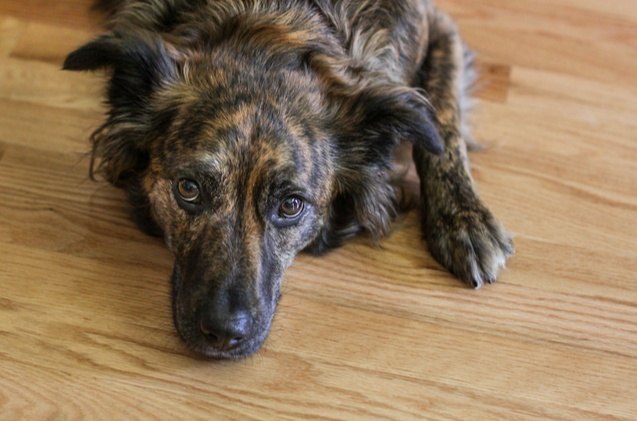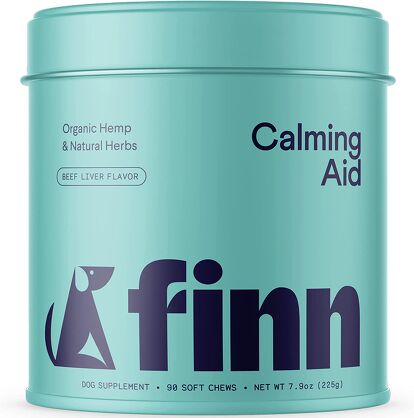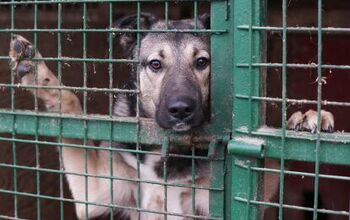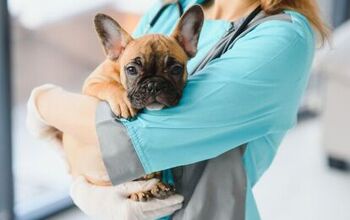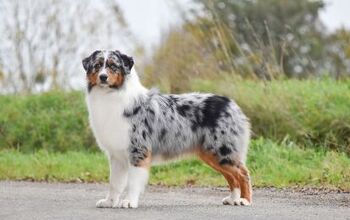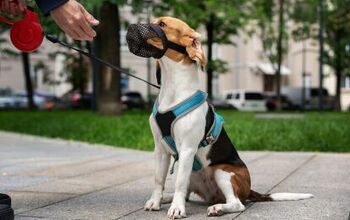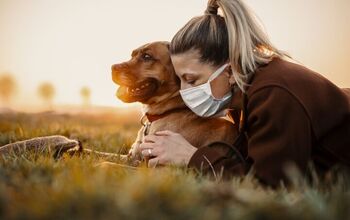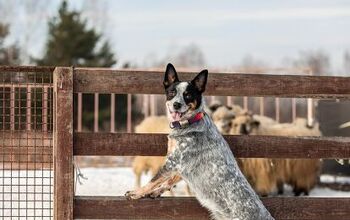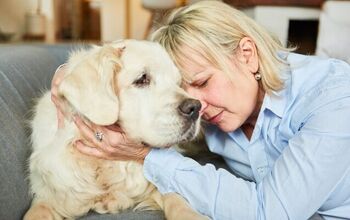Best Dog Anxiety Medications

Dog anxiety medications help manage your pet’s symptoms and let them lead a stress-free life. For dogs suffering from severe anxiety, these medications can be the only thing that ensures they can have a normal, tail wag-inspiring life.
Not all pooches go through life without a care in the world, their tail wagging and always on the lookout for some belly rubs. Unfortunately, a lot of dogs live with anxiety, whether chronic or situational, which makes it hard for them to really enjoy life as a pooch should. However, for most cases- even when it’s severe anxiety in question- proper approach and the right medication can eliminate anxiety symptoms or at least reduce them to an acceptable level that doesn’t interfere with your pet’s day to day life.
The same as there are varying levels to the severity of dog anxiety there are different causes behind your pet’s disorder and different ways they express their psychological issues. Regardless, for most (if not all) types of anxiety issues in pets, there are dog anxiety medications formulated to help them feel more relaxed, at ease, and improve their quality of life. From natural-based supplements to veterinarian-formulated medications and everything in between, there is a product that will offer relief to all stressed out doggos.
If you’re unsure what are the best dog anxiety medications that have an actual effect on pets and deliver tangible results, check out our list of the best-reviewed, most popular remedies out there. Whether your dog has separation anxiety, PTSD issues common for rescue dogs or gets antsy when certain situations happen, we’ve got you covered. Read on to find out what can you do to help your pet lead a happier life!
1. Editor’s Choice: Finn Calming Chews for Dogs
A natural treat to help ease and relax your pooch that tastes yummy to boot – what’s not to like? Made in the USA, in a cGMP facility that’s certified with the National Animal Supplement Council, these chews use only natural ingredients that promote calmness and reduce anxiety. The list includes melatonin, chamomile, passion flower, ginger root, and the calming amino acids l-theanine and l-tryptophan, all working together to keep your pooch soothed and relaxed. The chews are made through a cold-pressing process and contain no added fillers like corn, soy, or artificial flavors. And, to make sure even picky eaters will gladly nom these calming chews, they are made with natural cheese, real bacon, and real beef liver for a burst of irresistible flavor.
2. Runner Up: Richard’s Organics Pet Calm
Just a few drops of this calming solution will have an immediate effect on your pet’s behavior: whether you are using it for short term stress or to address chronic anxiety issues. This organic, drug-free, and natural liquid anxiety supplement relies on valerian, passionflower, chamomile, and skullcap extract combination to soothe the frayed nerves of any canine and reduce their nervous excitement. Most dogs love the taste so you can give them this supplement straight from the dropper–or mix it with food for picky pooches. Unlike some prescription drugs, Richard’s Organics Pet Calm solution won’t make your pet groggy or sleepy – rather, it will naturally ease and relax them.
3. Best Homeopathic: Rescue Remedy Stress Relief Pet Supplement
An alcohol-free, homeopathic solution based on Bach flower remedies, Rescue Remedy solution contains 5 flower essences: Star of Bethlehem for comfort, Rock Rose for fearlessness, Clematis for focus, Impatiens for patience, and Cherry Plum for composure. The formula is not just safe for dogs but for other pets, as well. The dosage doesn’t depend on your dog’s size but the severity of the stress he is experiencing–so this solution adapts to your pet’s needs and treats his specific anxiety issues. In general, as a plant-based supplement, this calming remedy is great for pets that are afraid of everyday things such as thunderstorms, fireworks, or are anxious in new environments such as the vet’s office or the grooming salon.
4. Best for Fireworks: HomeoPet Fireworks
Many pawrents don’t enjoy big holidays anymore–seeing as how they need to watch their pooch be severely stressed due to all that loud noise. This homeopathic solution was formulated to provide temporary relief to dogs (and other pets) without a sedating effect. The results can be seen in as little as 15 to 20 minutes and work on mild to moderate symptoms of anxiety such as drooling, panting, barking, hiding or attention-seeking behavior, and trembling.
5. Best Tablets: Nutramax Solliquin Chewable Tablets
The unusual formula of these anxiety-relieving chewable tablets is what often prompts vets to recommend them: if the usual stuff doesn’t work for your pet, it’s likely this combination will. Nutramax Solliquin Chewable Tablets contain l-theanine that stimulates the production of alpha waves in the brain and, as a result, a state of deep relaxation, and a mutually complementing mix of Magnolia and Phellodendron extracts for stress and anxiety control. To boot, this formula is enriched with whey protein concentrate that provides essential amino acids to your pet and works to offer anti-anxiety effect in the long run and not just provide temporary relief.
6. Best Hemp: Buster’s Organic 30,000 MG Hemp Oil for Cats and Dogs
Ideal for severe anxiety cases where only the strongest dog anxiety medications could make a difference, Buster’s Organic Pure Hemp Oil is 30 times more potent than average hemp oil. This is in part thanks to the advanced extraction process that results in the purest hemp oil available, with a dose of 30,000 MG in one small bottle. Needless to say, the results with this anxiety supplement are easy to notice–and in no time. The ingredients used for this calming remedy are organically grown in the USA, so you can rest assured you are getting a safe product made only with the highest quality ingredients.
7. Best Tasting: Zesty Paws Stress & Anxiety Calming Bites
Turkey-flavored and bite-sized, this anxiety supplement is easily delivered–no pooch will say no to a yummy treat! The formula contains organic hemp, chamomile, GRAS-designated form of L-Theanine, and Suntheanine: the combination has a powerful anxiety-relieving effect without making your pet feel drowsy. You can use Zesty Paws Stress & Anxiety Calming Bites regularly for chronic anxiety issues or when needed for immediate relief.
8. Best Soft Chews: NaturVet Quiet Moments Soft Chews Calming Supplement for Dogs
If you’re on a budget, these affordable yet effective calming soft chews for dogs are your best choice. With packages ranging from 70 to 360 count per bottle, there’s a size to meet any pooch’s needs and at a reasonable price, as well. The key ingredients in this anxiety medication are thiamine and L-Tryptophan in a unique blend that ensures potency and targeted effect – added ginger soothes upset tummies that come hand in hand with stress, and melatonin promotes better sleep and induces relaxation. The chews are to be given 30 minutes before a stressful event, so they are quick to work – the natural flavor makes them taste like a treat rather than medicine, so that’s a bonus, too.
9. Honorable Mention: Fur Goodness Sake Peaceful Pup Soft Chews Dog Supplement
Formulated to help manage everyday stress, these soft dog chews are perfect for pets that suffer from anxiety, nervousness, hyperactivity, or even aggression. Made in the USA, this calming supplement is formulated with 4 core, natural ingredients and zero fillers, so it offers a more potent absorption rate while still relying on natural remedies. The active ingredients include thiamine and L-Tryptophan, and calming herbs such as lemon balm and green tea. Only one soft chew per day is enough to keep stress at bay, so you can dole it out as a special treat – your pet will love the flavor!
10. Best Budget: Purina Pro Plan Veterinary Diets Calming Care Probiotic Dog Supplement
This novel anxiety supplement uses a probiotic strain BL999 to help your dog keep calm in the face of external stressors, be it a loud thunderstorm or a change in the routine. This is not an instant-working solution and it might take up to six weeks before you notice the first results, so be sure to start treatment on time if you want to see your pooch cool as a cucumber in stressful situations. Regular use of this supplement can help your pet deal with negative emotions and support a healthy immune system, as well.
11. BONUS ITEM: Thundershirt Classic Dog Anxiety Jacket
While not an anxiety medication for dogs per se, Thundershirt helped so many dogs experiencing anxiety that it would be a shame not to mention it- it might be just what your pooch needs. The idea behind this patented design is that the gentle, constant pressure this jacket puts on your pet’s body has a soothing and calming effect, whether your dog is just too excited or afraid of something. And with thousands of pawrents singing praises to Thundershirt, it’s no doubt that for many canines this unusual method works wonders: your pooch might be one of them.
Symptoms of anxiety in dogs
Every dog is unique–with his own quirks, temperament, and history. Needless to say, when it comes to behavioral issues, the way they show symptoms, or which symptoms can be noticed will vary greatly. For some pet parents, their dog’s anxiety disorder might be plain as day, but others might have trouble noticing or identifying the symptoms of anxiety in their pet’s behavior. In case you are unsure if your pet is just quirky or if they have a real problem, cross-check their behavior with this list of dog anxiety symptoms- if they match with more than one or two, it’s highly likely that they suffer from true anxiety and require treatment.
Aggressive behavior
This is the most extreme symptom of canine anxiety, and often the one that pet owners find most difficult to cope with. The feeling of nervousness and fear around people or other animals is transformed into one of your dog’s basic instincts– aggression as a defense mode. Your pet’s anxiety-induced aggression may vary in severity: from growls and bared teeth to biting and attacking. In most cases, the trigger for this type of aggression can be another dog (or animal) and your pet’s response to the feeling of fear is to charge at them or try to warn them with barking or growling. Sometimes, dogs can even snap at their owners if they try and interfere. In the case your dog is aggressive, it will probably take more than just anxiety medications to sort them out- training, socialization and behavioral therapy could be of help in the cases where aggression is serious.
Peeing and pooping in the house
If your dog is potty trained but happens to pee or poop in the house on certain occasions, it can be a symptom of an underlying issue. If inappropriate elimination is more than a one-time occurrence for a housebroken dog, it can’t be written off as just an “accident”. Eliminate any potential health issues that might be causing your dog to pee and/or poop before looking into the behavioral aspect: in case there are no medical conditions that are causing this, it’s highly likely that your dog’s anxiety is manifesting through this unusual behavior.
Destructive behaviors
As soon as you turn your back on your pooch, they start gnawing your shoes, ripping sofa pillows with their claws and canines, or pawing and chewing doorways and windows. This type of destructive behavior is most commonly connected to separation anxiety. In your absence, your dog will either act out by destroying your valuables or work himself up so much that he tries to break out of the house (e.g. chewing entry points). Not only that this anxiety symptom results in lots of ruined furniture and prized possessions, but it can also cause injury to your pet- many dogs try to break out of their crates during an anxiety attack and get hurt or end up swallowing something they chewed on and getting an intestinal obstruction.
Body language: shaking, drooling, panting
Those small signals can tell a lot: if you notice a pattern when something triggers your pooch (like you leaving your home, being around men/women, meeting a new dog, etc) and he reacts by shifting his body language, it could be that they are feeling anxious. Shaking, drooling, and panting are all signs of canine anxiety, so be sure to keep an eye out, especially in situations that are new to your dog.
Hiding or seeking shelter
If your pooch suddenly looks for a place to hide or comes to you and asks to be held or comforted, try to get to the root of it: this behavior can signal that your pet is anxious about something and it could be of great help if you know what’s his trigger.
Causes of canine anxiety
There are many reasons why dogs can be anxious–from situational to behavioral- and it’s important to know which of them is the reason for your dog’s anxiety issues. Knowing the cause of your pet’s anxiety is the first step to treating it successfully as understanding what triggers your pet’s fears and stress will help you better manage their disorder- in addition to dog anxiety medications.
Separation
One of the most common triggers for canine anxiety is being separated from their owner. These dogs can’t be left alone or they’ll become destructive or make a fuss with whining and barking their heads off. You might find it flattering that your pooch is so devoted to you that they can’t bear being away from you but this is not a sign of a healthy bond between a pet and their owner. Separation anxiety in dogs is a result of their insecurity, poor socialization and lack of training more than anything else–be sure to work with your pooch to build their confidence in addition to giving them dog anxiety medications.
Past trauma
When you adopt a dog from a rescue or a shelter, you rarely get to know their tale–more often than not, it includes some form of trauma. In the best-case scenario, they will have abandonment issues, but in the worst, there could have been abuse in their past lives. As a result, these dogs can develop some anxiety issues–for instance, be afraid of men or women that remind them of their abuser, or poorly react to other dogs due to lack of socialization in their previous home.
Lack of socialization
In addition to basic training, all puppies should be socialized on time–exposure to different scenarios and all kinds of people and animals can only benefit a young pooch. Dogs who didn’t have a chance to be out and about and come in contact with other pets could develop anxieties later on in life- they might be too afraid to go to the dog park with you, or worse, snap at people and animals that make them nervous.
Genetic disposition
Sometimes, there is no tangible cause to your dog’s anxious behavior- it’s their genetics to blame. Certain dog breeds are prone to so-called “generalized anxiety” that might not be as severe, but can certainly affect your pet’s daily life. Breeds that are likelier to have anxiety issues are those with high energy levels and higher IQ than most–this includes breeds such as the German Shepherd, Australian Shepherd, Cocker Spaniel, Bernese Mountain Dog, Border Collie, Labrador Retriever, Jack Russell Terrier, and many others.
Response to fear-inducing triggers
This type of dog anxiety is temporary: it happens when a dog is exposed to frightening stimuli and passes once the cause is removed. Many dogs experience this type of anxiety during the holidays, in response to loud sounds of fireworks and firecrackers, or for instance during storms–when the crack of thunder causes their fear. While this type of anxiety doesn’t impact your dog’s daily life it can be dangerous to let them get worked up–people often give their pets dog anxiety medications in triggering situations as a preventative.
How do you calm a stressed dog?
The easiest way to reduce stress in dogs is through regular exercise and mental stimulation (redirecting their attention to a fun task or a puzzle). However, that’s not always going to do the trick, even though it’s the foundation of a stress-free canine life. When your pet is stressed, try to remove them from the environment or remove the trigger from their surroundings to see if it will bring them back to a state of calmness – and if a stressor is something that can’t be controlled (e.g. thunderstorm) or that has to be repeated (e.g. visit to the vet or the groomers), a calming supplement given in advance can be a great solution. If your pet’s stress is chronic and affects their quality of life, consult a vet for more options on treatment, including prescribed anxiety medications for dogs.
What is the best natural calming aid for dogs?
There isn’t a single best natural calming aid for dogs – some pets respond better to certain ingredients, and others do better with different formulas, so it is all very individual. In general, most pets have the best results with natural calming aids that contain hemp, thiamine, L-tryptophane, Valerian root, or melatonin, or even a potent blend of these ingredients. Until you try, you can’t know for sure which formula will be the one that is the most effective for your dog’s stress issues.
What to consider when choosing anxiety medication for my dog?
Most anxiety medications for dogs are prescribed by the veterinarian, but they are only meant for severe cases of anxiety and stress. For everyday stress or anxiety in certain situations such as thunderstorms or vet visits, pet owners opt for OTC calming supplements and remedies – but there are a few factors to consider when choosing these types of anxiety medications. First is the form: some are chewables, other tablets, and some come as liquid solutions – choose the one that will be the easiest to administer to your dog, either directly or through food. Another important factor to consider is the formula’s potency – go for calming aids that contain provenly effective ingredients such as hemp, thiamine, L-tryptophane, Valerian root, or melatonin.
What dog breeds have the most anxiety?
Anxiety in dogs can appear regardless of the dog’s breed or parentage, but studies do indicate that some breeds are more likely to develop anxiety than others. A study conducted in Finland identified Lagotto Romagnolo Spanish Water dogs, Shetland Sheepdogs, Wheaten Terriers and Miniature Schnauzers as breeds most likely to suffer from anxiety. However, there’s more research to be done – and with a greater sample – before anything could be considered conclusive and definitive.
Additional resources:
We are committed to finding, researching, and recommending the best products. We earn commissions from purchases you make using the retail links in our product reviews. Learn more about how this works.

A proud mama to seven dogs and ten cats, Angela spends her days writing for her fellow pet parents and pampering her furballs, all of whom are rescues. When she's not gushing over her adorable cats or playing with her dogs, she can be found curled up with a good fantasy book.
More by Angela Vuckovic



